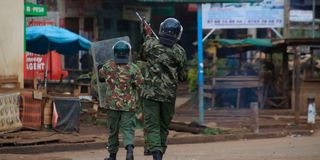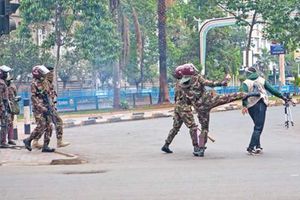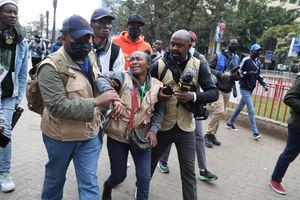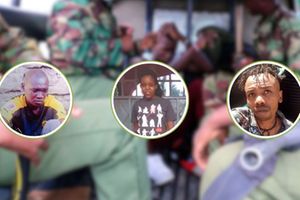
Brian Mwangi speaks at Kenyatta National Hospital on March 21, 2025.
The air in the orthopaedic ward at Kenyatta National Hospital (KNH) carries the familiar scent of antiseptic — sharp, sterile, and inescapable.
It’s the smell of survival, of lives interrupted and stitched together again.
Amid this clinical quiet lies Brian Mwangi Wangari, a 30-year-old man whose life changed in a split second during the Nane Nane protests on August 8, 2024.
Mwangi lay on his stomach, finishing a simple meal, his lower body bandaged and immobile beneath a worn bedcover.
Surrounded by fellow patients recovering from serious spinal injuries, the ward was filled with quiet suffering—each bed a testament to pain and resilience.
Mwangi, who once earned a living doing odd jobs in Karatina town—fixing tyres, washing cars, and carrying luggage—has now spent the past seven months confined to a hospital bed, paralysed from the waist down after a bullet tore through his spine.
On the day of the protests, Mwangi says he wasn’t even part of the chaos.
“My friends and I were sitting on a small hill, watching the protests. People were burning tyres and throwing stones at the police. Then, suddenly, the crowd was being chased toward us. Everyone ran. I didn’t make it,” he recalls, his voice barely rising above a whisper.
He was shot. And when he woke up, he was at Karatina Hospital. Two days later, he was transferred to KNH, stabilised and admitted to the orthopaedic ward.
Mwangi lies on his hospital bed which has a worn-out blue bedcover, his legs immobile. Bandages cover parts of his back and spine. He now depends on adult diapers and is fighting persistent bed sores that have delayed the surgery he so desperately needs.
“I got my first bed sores in the previous ward because staff took too long to turn me over,” he says.

Police pursue protesters during Nane Nane anti-government demonstrations in Karatina town, Nyeri County, on August 8, 2024.
“There’s one large sore on my back and several others. Some have healed after skin grafting, but the big one keeps opening up. They tell me they can’t operate until it heals,” he adds. “Every week, they say ‘next week.’ But nothing happens. I just lie here, eating and sleeping. I want the bullet removed. I want a spinal implant. I want my life back,” Mwangi says, then pauses.
“Sometimes, I think about ending it. I can’t feel my body below my stomach. They change my diaper only twice a day. When the catheters failed, some medics accused me of removing them. They even threatened to throw me out.”
Mwangi’s maternal aunt, Esther Wangui, has been his caregiver since he lost his parents as a child. She received a call from a doctor at Karatina Hospital on the night of the shooting and rushed there the next morning.
An X-ray confirmed what doctors feared: a bullet had lodged in his spine, causing irreversible damage.
“At KNH, they said his spinal cord and nerves were affected, that was paralysed. We were told to buy a spinal implant to repair the damage. I raised Sh200,000. But to this day, it hasn’t been used,” Wangui says, adding that each time one bed sore begins to heal, another appears.
“At first we had hope. We believed he’d get better. But now even Brian can see our encouragement is becoming hollow. He’s growing weaker. He used to sit up to eat. Now, he can barely lift his head,” she says.
“I’m unemployed and depend entirely on my husband’s income. I try to visit him every day from Ruiru, but even fare has become a struggle,” she adds, tears welling in her eyes.
“We’re pleading with the hospital to waive the bill and discharge him, so we can fundraise and transfer him to another facility for urgent surgery.”

A policeman pursues protesters during the Nane Nane anti-government demos in Karatina town, Nyeri County, on August 8, 2024.
Wangui said her nephew was not a protester, only an innocent bystander.
KNH Chief Executive Officer could not be reached for comment. However, Senior Director of Clinical Services Dr William Sigilai confirmed that Mwangi was referred to KNH from Karatina Hospital on August 10, 2024, after a bullet penetrated his chest and lodged in his spine.
“He had a significant lung injury, and blood had accumulated in his thoracic cavity,” said Dr Sigilai.
“A tube was inserted to drain the blood. The bullet caused complete spinal cord damage.”
Dr Sigilai noted that while an MRI was initially planned, it couldn’t be done with the bullet still lodged in his body.
During his stay, Mwangi developed bed sores in the pelvic region, complicating surgery plans.
“Plastic surgeons have operated to treat the sores. But surgery to remove the bullet cannot proceed until the wounds fully heal,” he said.
He added that the surgery is only to remove the bullet—not to restore function. “The spinal cord is shattered. He’s unlikely to walk again.”
Dr Sigilai also stated that the hospital has not asked the family to settle any bill since Mwangi is still under treatment.
Furthermore, no formal request for his transfer to another hospital has been received.
“He remains a patient in KNH. He’s still getting the care that he had been scheduled for him. If a doctor prescribes a treatment regime plan it is because of a reason. It is not because they have decided to abandon that patient. The sores have to be taken care of first,” said Dr Sigilai.
In the sterile stillness of KNH’s orthopaedic ward, Brian Mwangi waits—not just for surgery, but for a sense of dignity and a future beyond hospital walls.
For now, the bullet remains in his body, and the weight of his wait grows heavier each day—and he and his aunt pray for a miracle.








